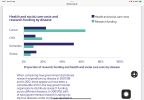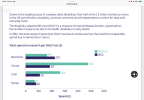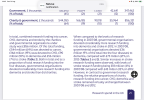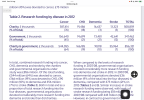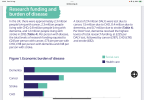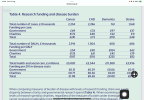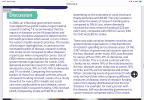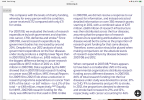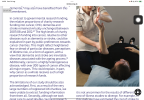My brain is toast but this is the material that I’d read previously that analysed stroke and dementia disease etc burden & charity & government spending in 2016. It’s very good, although I don’t pretend my brain could compute it all.
https://www.stroke.org.uk/sites/default/files/sa-research_spend_in_the_uk_july2016_web.pdf
Here are some key quotes as well as screenshots of most relevant charts.
"Although dementia accounts for over 50% of the combined health and social care costs of the four diseases under study, it receives 10% of combined research funding. Furthermore, stroke accounts for 13% of costs but only receives 7% of the research funding. In contrast, cancer, which accounts for approximately 20% of health and social care costs, receives nearly two thirds of the total medical research funding for these four diseases."
"Both in total and as a proportion of total research funding into the four diseases, governmental organisations devoted considerably more research funding into dementia and stroke than did charities."
"However, the increases in research funding into dementia and stroke could be explained, in part, by the strong commitment by the UK government, since 2010, to increase the the levels of research funding into dementia, and in a context when overall expenditure on research also increased. Stroke, as a recognised major risk factor for developing dementia, may also have benefited from this commitment,"
"The high levels of charity research funding into cancer, relative to other diseases such as dementia or stroke, could be explained in part by public preferences towards cancer charities. This might reflect heightened fear or dread of particular diseases, perceptions of lifetime risk, or a form of ageism, with a view that dementia and stroke are inevitable diseases associated with the ageing process. Additionally, cancer is a highly heterogeneous disease, with over 200 types of cancer affecting all major organs. This could explain, in part, why cancer as a whole receives such a high proportion of research funds."
"it is not uncommon for the results of different cost-of-illness studies to diverge. For example, in this study we have estimated the cost of stroke to the UK in terms of health and social care to be £3 billion in 2012. However, a previous study found that the cost of stroke to the UK health and social care system was £4.4 billion in 2005."
Gemini AI helped with these summaries, relevant because of the ME/CFS £3-6b annual cost to the economy & £4/patient/year state research funding. I don’t think we’ve got comparable written material, arguing the economic justice case to accompany the video that Peter White produced & I think that would be useful.
Gemini
“Funding Disparity: In 2012, stroke research received less funding than cancer (£544 million), CHD (£166 million), and dementia (£90 million). The research funding per person with stroke was £48, which is about one-fifth of the funding per person with cancer (£241) and less than half of that for dementia (£118).”
“Research Funding vs. Disease Burden: The report highlights a stark contrast between research funding and the burden of the disease.
For every £10 in health and social care costs associated with stroke, only £0.19 was received in research funding. In comparison, cancer received £1.08 and CHD received £0.65 for every £10 of their respective costs”
“Based on the provided report, here is what it says about the differences in government and charity spending on stroke research in the UK:
Funding in 2012
In 2012, governmental and charity organizations together spent £56 million on stroke research, which was 7% of the total research funding for the four diseases studied (stroke, cancer, CHD, and dementia). The combined research funding into the four diseases by governmental and charity organizations was £856 million.
Governmental spending: Governmental organizations spent £43 million on stroke research, which accounted for 12% of their total research spend across the four diseases.
Charity spending: Charities spent £13 million on stroke research, which was only 3% of their total research funding for the four diseases.
The report notes that governmental organizations dedicated considerably more funding to dementia and stroke research, both in total and as a proportion of total research funding, than charities did.
Changes over time
From 2007/08 to 2012, there was a significant shift in how governmental organizations allocated their research funding. The proportion of governmental funding for stroke research increased from 4% in 2007/08 to 12% in 2012.
In contrast, the report found that the relative proportions of charity research funding for stroke, cancer, CHD, and dementia remained virtually unchanged between 2007/08 and 2012.”

